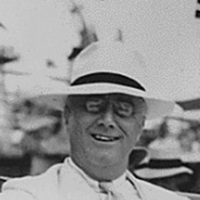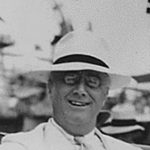Commentary by Jonathan Matthes

The highlights of Franklin Delano Roosevelt’s life are not exactly unknown to us.
Suffered from polio, check. Elected president not once, not twice, not thrice, but four times, check. Endured the Great Depression and World War II, check. Said, “the only thing we have to fear is fear itself,” and “December 7, 1941, a date which will live in infamy.” So, we’re not going to talk about him anymore.
No, we’re going to focus on another set of characters connected with FDR: the four men who challenged him for the presidency and lost.
We normally don’t throw parades to teams that miss the playoffs. Nor do we immortalize, in silver on the Borg Warner Trophy, the fifth-place finisher in the Indianapolis 500. Congratulations Charlie Kimball!
This column is going to break with that venerable tradition of hailing victors. We’re going to give long-awaited shout-outs to the losers. Below, the quartet of losers, or to put it more mildly – and less humorously – the four candidates that were defeated by FDR.
Herbert Hoover, 1932 election
I know. You’re not a fan of his, but try to set aside you’re preconceived notions of Bert Hoover for, like, 20 seconds. Can you do that for me? Thanks. Hoover was one of the more popular candidates for president ever. Everyone wanted him: Democrats, Republicans, the British Crown, the Philadelphia Phillies, everyone. Why?
Hoover made a name for himself as a crisis manager. And by “made a name” I mean, he was the best at it. He was in Europe during World War I. Hoover supervised a project to aid Americans stranded in London. Then, when famine threatened Belgium, Hoover worked with the Belgian government and formed the “Belgian Relief” organization which had 600 ships at its disposal to help ferry food into Belgium.
Woodrow Wilson wanted Hoover to join his cabinet, which he turned down. He joined Warren Harding’s cabinet, as Secretary of Commerce, when Harding offered him any position he wanted. Under Calvin Coolidge, Hoover was sent to handle a nasty flood in Mississippi, which he did well. People once begged him to run for president, which he turned down, but then he ran successfully for president in 1928. Then, the Great Depression happened, and now you remember Hoover the way you do.
In baseball terms, Hoover was more like a pitching coach than a manager. He didn’t have the force of personality to be the headman; he was at his best when he could specialize on a particular discipline. In other words, he was poorly cast as president. Hoover would live another 32 years after his presidency ended and spent it very productively. He continued humanitarian and organizational work inside the U.S. government under Presidents Roosevelt, Truman and Eisenhower. He also fished; nothing wrong with that, the man liked to fish.
Alf Landon, 1936 election
Poor Alf Landon. The dude didn’t stand a chance. FDR was wildly popular when he ran for reelection and liked to utter, “Are you better off now than when I took office?” Everyone answered ‘yes’ and then didn’t vote for Landon in the election.
Landon was elected governor of Kansas in 1932. He was the only Republican west of the Mississippi River to become governor that year. This got him on the national radar, especially when 1936 came around, and the Republicans were looking for someone, anyone to run against Roosevelt.
Landon gave it a go and got thumped. Maine had a long run of picking correctly in presidential elections. There was a common saying, “As goes Maine, so goes the nation.” Well, Landon won only Maine and Vermont. He had good humor about it and said, “As goes Maine, so goes Vermont.”
He would finish out his term as governor and, in time, morph into the senior sage of the Republican Party. Landon would live to be 100. Ronald and Nancy Reagan would seek him out just before his centennial birthday, with President Reagan saying, “In a hundred years, Alf Landon has chased many dreams and caught most of them.”
Wendell Willkie, 1940 election
Willkie was a businessman from Elwood, Ind., and spent most of his life as a Democrat. He didn’t become a Republican until 1939, actually, which is eerily close to the 1940 election, don’t you think? More on that in a moment.
He did have a pretty impressive resume. As a lawyer, he battled against the Ku Klux Klan. Then, as a businessman, he found himself in charge of several large companies, which is where he came into conflict with FDR. Willkie had been an ardent Democrat, but Roosevelt wanted to break up two of his companies in his Tennessee Valley Authority initiative.
This was the breaking point. FDR’s New Deal had long been ruffling the feathers of pro-business Democrats, but Willkie had had enough. He changed parties and crashed the Republican convention as a huge dark horse.
Roosevelt called Willkie, “the most formidable candidate that the Republicans could come up with.” Another thing going against FDR was that no one had run for a consecutive, third term before. This was not immediately a popular decision. But with World War II raging, Roosevelt decided to run. It was a close race until FDR made a promise, in Boston, that he wouldn’t send American sons overseas. He was lying, but it worked, and Willkie was done.
After his failed attempt, Willkie spent some time as a special envoy to Great Britain and some work in Hollywood where he advocated for more lead roles for black actors and actresses. He would die of a heart attack in 1944 at the age of 52.
Thomas Dewey, 1944 election
“Dewey Defeats Truman.” Yeah, we’re talking about that Dewey, and spoiler alert, Dewey did not defeat Truman, and he also didn’t defeat Roosevelt.
His name was Thomas Dewey. He was a three-term governor from New York and lost both the 1944 and 1948 campaigns for president.
Dewey looked like the quintessential 1940s politician: clean-cut, slicked hair, dark mustache, and he had no skeletons in his closet. But, he was also boring and didn’t really like to campaign all that much, but he came ever so close to becoming president, twice.
In ’44, President Roosevelt’s health was of significant concern, and he was in fact dying. But with the second World War still raging, and with American boys fighting and dying in Europe and the Pacific Islands, continuity seemed of increasing importance. FDR would win, but it would be the closest of the four elections.
In ’48, President Harry Truman was not that popular, and Dewey was. Everyone who was anyone boldly predicted that Thomas Dewey would win the election and become the 34th president of the United States. Everyone who was anyone was wrong. But, because the polling seemed so sound, Dewey took time off campaigning and played it easy. Truman pushed hard, right up until the end. And won.
Dewey didn’t completely disappear from public life. He would help get Dwight Eisenhower elected president in 1952, and he wouldn’t wrap up his time as governor until 1953. He would return to his law practice and would eventually be offered a spot on the Supreme Court, which he would decline, saying he was too old. Eight days before his 69th birthday, Dewey would die of a heart attack while on vacation in Florida.
There they are. All four. The runner-ups to Franklin Roosevelt, at least you can name them now!
Special thanks to the Kansas Historical Society, Miller Center of Public Affairs at the University of Virginia, Dave Rodgers at Zionsville Community High School, the Ken Burns documentary, “The Roosevelts, an Intimate History,” The New York Times’ Alf Landon obituary from Oct. 13, 1987, Lillian Cunningham of the Washington Post and the podcast “Presidential,” and Brandon Seitz.




